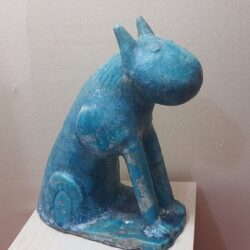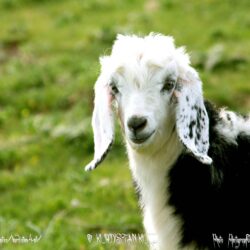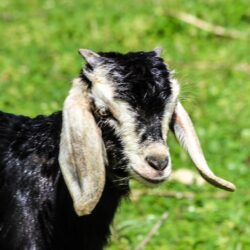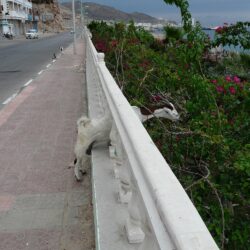| Source (Aramaic) | Source (Yiddish) | Transliteration (romanized Yiddish) | Translation (English) |
|---|---|---|---|
חַד גַּדְיָא, חַד גַּדְיָא. |
אײן ציקלײן אײן ציקלײן |
Ein tsikleyn, eyn tsikleyn, |
One little goat, one little goat. |
דְּזַבִּן אַבָּא בִּתְרֵי זוּזֵי, חַד גַּדְיָא, חַד גַּדְיָא. |
דז האט גיקױפֿט מײן פֿעטרלײן אום צװײא פפענינג אײן ציקלײן אײן ציקלײן׃ |
dos hat gikoyft meyn fetrleyn, um tsvey pfening, eyn tsikleyn, eyn tsikleyn. |
…that my father bought for two zuzim. One little goat, one little goat. |
וְאָתָא שֻׁנְרָא וְאָכְלָה לְגַדְיָא, דְּזַבִּן אַבָּא בִּתְרֵי זוּזֵי, חַד גַּדְיָא, חַד גַּדְיָא. |
דא קומט דז קעצלײן אונ׳ עשט דז ציקלײן דא האט גיקױפֿט מײן פֿעטרלײן אום צװײא פפענינג אײן ציקלײן אײן ציקלײן׃ |
Da komt di ketsleyn un esht dos tsikleyn dos da hat gikoyft meyn fetrleyn, um tsvey pfening, eyn tsikleyn, eyn tsikleyn. |
A cat came and ate the goat that my father bought for two zuzim. One little goat, one little goat. |
וְאָתָא כַּלְבָּא וְנָשַׁךְ לְשֻׁנְרָא, דְּאָכְלָה לְגַדְיָא, דְּזַבִּן אַבָּא בִּתְרֵי זוּזֵי, חַד גַּדְיָא, חַד גַּדְיָא. |
דא קאם דז הינטלײן אונ׳ בײשט דז קעצלײן דז דא האט גיגעשין דז ציקלײן דא האט גיקױפֿט מײן פֿעטרלײן אום צװײא פפענינג אײן ציקלײן אײן ציקלײן׃ |
Da kam dos hintleyn, un beysht dos ketsleyn, dos da hat gigeshin dos tsikleyn, dos da hat gikoyft meyn fetrleyn, um tsvey pfening, eyn tsikleyn, eyn tsikleyn. |
A dog came and bit the cat that ate the goat that my father bought for two zuzim. One little goat, one little goat. |
וְאָתָא חֻטְרָא וְהִכָּה לְכַלְבָּא, דְּנָשַׁךְ לְשֻׁנְרָא, דְּאָכְלָה לְגַדְיָא, דְּזַבִּן אַבָּא בִּתְרֵי זוּזֵי, חַד גַּדְיָא, חַד גַּדְיָא. |
דא קאם דז שטעקלײן אונ׳ שלאגט דז דא האט גביסן דז קעצלײן דז דא האט גיגעשין דז ציקלײן דא האט גיקױפֿט מײן פֿעטרלײן אום צװײא פפענינג אײן ציקלײן אײן ציקלײן׃ |
Da kam dos shtekleyn, un shlagt dos hintleyn, dos da hat gbishn dos ketsleyn, dos da hat gigeshn dos tsikleyn, dos da hat gikoyft meyn fetrleyn, um tsvey pfening, eyn tsikleyn, eyn tsikleyn. |
A stick came and hit the dog that bit the cat that ate the goat that my father bought for two zuzim. One little goat, one little goat. |
וְאָתָא נוּרָא וְשָׂרַף לְחֻטְרָא, דְּהִכָּה לְכַלְבָּא, דְּנָשַׁךְ לְשֻׁנְרָא, דְּאָכְלָה לְגַדְיָא, דְּזַבִּן אַבָּא בִּתְרֵי זוּזֵי, חַד גַּדְיָא, חַד גַּדְיָא. |
דא קאם דז פֿײארלײן אונ׳ פֿר ברענט דז שטעקלײן דז האט גישלאגין דז הינטלײן דז דא האט גביסן דז קעצלײן דז דא האט גיגעשין דז ציקלײן דא האט גיקױפֿט מײן פֿעטרלײן אום צװײא פפענינג אײן ציקלײן אײן ציקלײן׃ |
Da kam dos fayrleyn un far brent dos shtekleyn, dos hat gishlagin dos hintleyn, dos da hat gbishn dos ketsleyn, dos da hat gigeshn dos tsikleyn, dos da hat gikoyft meyn fetrleyn, um tsvey pfening, eyn tsikleyn, eyn tsikleyn. |
A fire came and burned the stick that hit the dog that bit the cat that ate the goat that my father bought for two zuzim. One little goat, one little goat. |
וְאָתָא מַיָּא וְכָבָה לְנוּרָא, דְּשָׂרַף לְחֻטְרָא, דְּהִכָּה לְכַלְבָּא, דְּנָשַׁךְ לְשֻׁנְרָא, דְּאָכְלָה לְגַדְיָא, דְּזַבִּן אַבָּא בִּתְרֵי זוּזֵי, חַד גַּדְיָא, חַד גַּדְיָא. |
דא קאם דז װאשרלײן אונ׳ פֿײארלײן דש דא האט פֿר ברענט דז שטעקלײן דז דא האט גישלאגין דז הינטלײן דז דא האט גביסן דז קעצלײן דז דא האט גיגעשין דז ציקלײן דא האט גיקױפֿט מײן פֿעטרלײן אום צװײא פפענינג אײן ציקלײן אײן ציקלײן׃ |
Da kam dos washrleyn, un far lesht dash fayrleyn, dash da hat far brent dos shtekleyn, dos da hat gishlagn dos hintleyn, dos da hat gbishn dos ketsleyn, dos da hat gigeshn dos tsikleyn, dos da hat gikoyft meyn fetrleyn, um tsvey pfening, eyn tsikleyn, eyn tsikleyn. |
Water came and put out the fire that burned the stick that hit the dog that bit the cat that ate the goat that my father bought for two zuzim. One little goat, one little goat. |
וְאָתָא תּוֹרָא וְשָׁתָא לְמַיָּא, דְּכָבָה לְנוּרָא, דְּשָׂרַף לְחֻטְרָא, דְּהִכָּה לְכַלְבָּא, דְּנָשַׁךְ לְשֻׁנְרָא, דְּאָכְלָה לְגַדְיָא, דְּזַבִּן אַבָּא בִּתְרֵי זוּזֵי, חַד גַּדְיָא, חַד גַּדְיָא. |
דא קאם דער אקס אונ׳ טרינקט דש װאשרלײן דז דא האט פֿר לעשט דז פֿײארלײן דז דא האט פֿר ברענט דז שטעקלײן דז דא האט גישלאגין דז הינטלײן דז דא האט גביסן דז קעצלײן דז דא האט גיגעשין דז ציקלײן דא האט גיקױפֿט מײן פֿעטרלײן אום צװײא פפענינג אײן ציקלײן אײן ציקלײן׃ |
Da kom der oks un trinkt dash washrleyn, dos da hat far lesht dos fayrleyn, dos da hat par brent dos shtekleyn, dos da hat gishlagn dos hintleyn, dos da hat gbishn dos ketsleyn, dos da hat gigeshn dos tsikleyn, dos da hat gikoyft meyn fetrleyn, um tsvey pfening, eyn tsikleyn, eyn tsikleyn. |
An ox came and drank the water that put out the fire that burned the stick that hit the dog that bit the cat that ate the goat that my father bought for two zuzim. One little goat, one little goat. |
וְאָתָא הַשּׁוֹחֵט וְשָׁחַט לְתוֹרָא, דְּשָׁתָא לְמַיָּא, דְּכָבָה לְנוּרָא, דְּשָׂרַף לְחֻטְרָא, דְּהִכָּה לְכַלְבָּא, דְּנָשַׁךְ לְשֻׁנְרָא, דְּאָכְלָה לְגַדְיָא, דְּזַבִּן אַבָּא בִּתְרֵי זוּזֵי, חַד גַּדְיָא, חַד גַּדְיָא. |
דא קאם דער שוחט אונ׳ שעכט דען אקסין דער דא האט גיטרונקן דש װאשרלײן דז דא האט פֿר לעשט דז פֿײארלײן דז דא האט פֿר ברענט דז שטעקלײן דז דא האט גישלאגין דז הינטלײן דז דא האט גביסן דז קעצלײן דז דא האט גיגעשין דז ציקלײן דא האט גיקױפֿט מײן פֿעטרלײן אום צװײא פפענינג אײן ציקלײן אײן ציקלײן׃ |
Da kom der shoḥeyt un shekht den oksin, der da hat gitrunkn dash washrleyn, dos da hat far lesht dos fayrleyn, dos da hat far brent dos shtekleyn, dos da hat gishlagn dos hintleyn, dos da hat gbishn dos ketsleyn, dos da hat gigeshn dos tsikleyn, dos da hat gikoyft meyn fetrleyn, um tsvey pfening, eyn tsikleyn, eyn tsikleyn. |
A butcher came and slaughtered the ox that drank the water that put out the fire that burned the stick that hit the dog that bit the cat that ate the goat that my father bought for two zuzim. One little goat, one little goat. |
וְאָתָא מַלְאַךְ־הַמָּ֫וֶת וְשָׁחַט לְשׁוֹחֵט, דְּשָׁחַט לְתוֹרָא, דְּשָׁתָא לְמַיָּא, דְּכָבָה לְנוּרָא, דְּשָׂרַף לְחֻטְרָא, דְּהִכָּה לְכַלְבָּא, דְּנָשַׁךְ לְשֻׁנְרָא, דְּאָכְלָה לְגַדְיָא, דְּזַבִּן אַבָּא בִּתְרֵי זוּזֵי, חַד גַּדְיָא, חַד גַּדְיָא. |
דא קאם דער מלאך המות אונ׳ שעכט דען שוחט דער דא האט גישעכט דען אקסין דער דא האט גיטרונקן דש װאשרלײן דז דא האט פֿר לעשט דז פֿײארלײן דז דא האט פֿר ברענט דז שטעקלײן דז דא האט גישלאגין דז הינטלײן דז דא האט גביסן דז קעצלײן דז דא האט גיגעשין דז ציקלײן דא האט גיקױפֿט מײן פֿעטרלײן אום צװײא פפענינג אײן ציקלײן אײן ציקלײן׃ |
Da kom der Malakh haMovet un shekht den shoḥeyt, der da hat gishekht den oksin, der da hat gitrunkn dos washrleyn, dos da hat far lesht dash fayrleyn, dos da hat far brent dos shtekleyn, dos da hat gishlagn dos hintleyn, dos da hat gbishn dos ketsleyn, dos da hat gigeshn dos tsikleyn, dos da hat gikoyft meyn fetrleyn, um tsvey pfening, eyn tsikleyn, eyn tsikleyn. |
The Angel of Death came and slaughtered the shoḥet who slaughtered the ox that drank the water that put out the fire that burned the stick that hit the dog that bit the cat that ate the goat that my father bought for two zuzim. One little goat, one little goat. |
וְאָתָא הַקָּדוֹשׁ־בָּרוּךְ־הוּא וְשָׁחַט לְמַלְאַךְ־הַמָּ֫וֶת דְּשָׁחַט לְשׁוֹחֵט, דְּשָׁחַט לְתוֹרָא, דְּשָׁתָא לְמַיָּא, דְּכָבָה לְנוּרָא, דְּשָׂרַף לְחֻטְרָא, דְּהִכָּה לְכַלְבָּא, דְּנָשַׁךְ לְשֻׁנְרָא, דְּאָכְלָה לְגַדְיָא, דְּזַבִּן אַבָּא בִּתְרֵי זוּזֵי, חַד גַּדְיָא, חַד גַּדְיָא. |
דא קאם אונזר ליבר הער גאט אונ׳ שעכט דען מלאך המות דער דא האט גישעכט דען שוחט דער דא האט גישעכט דען אקסין דער דא האט גיטרונקן דש װאשרלײן דו דא האט פֿר לעשט דו פֿײארלײן דו דא האט פֿר ברענט דו שטעקלײן דו דא האט גישלאגין דו הינטלײן דו דא האט גביסן דו קעצלײן דו דא האט גיגעשין דו ציקלײן דא האט גיקױפֿט מײן פֿעטרלײן אום צװײא פפענינג אײן ציקלײן אײן ציקלײן׃ |
HaḲadosh Barukh Hu da kom unzr libr her got un shekht den Malakh haMovet, der da hat gishekht den shoḥeyt, der da hat gishekht den oksin, der da hat gitrunkn dash washrleyn, dos da hat far lesht dos fayrleyn, dos da hat far brent dos shtekleyn, dos da hat gishlagn dos hintleyn, dos da hat gbishn dos ketsleyn, dos da hat gigeshn dos tsikleyn, dos da hat gikoyft meyn fetrleyn, um tsvey pfening, eyn tsikleyn, eyn tsikleyn. |
Then the blessed Holy One came and slaughtered the Angel of Death who slaughtered the shoḥet who slaughtered the ox that drank the water that put out the fire that burned the stick that hit the dog that bit the cat that ate the goat that my father bought for two zuzim. One little goat, one little goat. |
Singing Ḥad Gadya is thus particularly apropos for the night of Passover since, in the Jewish calendar, this one night, different from all other nights, is considered the most dangerous night of the year — it is the time in which the forces of darkness in the world are strongest. Why? It is on this night that the divine aspect of mashḥit, the executioner, is explicitly invoked, as explained in the midrash for Exodus 12:12 read in the maggid section of the Haggadah for Passover:
“I will pass through the land of Mitsrayim:” — I, and not an angel. “and I will smite every firstborn:” — I, and not a seraf. “And I will execute judgment against all the gods of Mitsrayim:” — I, and not the messenger. “I am YHVH” — I, and no other. |
Sources


Prague Haggadah (1590) NLI link
Recordings
Ḥad Gadya here is sung by Moishe Oysher with the Abraham Nadel Chorus (circa 1955?), in Aramaic and Hebrew. This stop-motion animation was created by Nina Paley (animator, director) with the help of Theodore Gray (stitchcoder, embroiderer) and Nick Mann (lights, camera).
Notes

“חַד גַּדְיָא | Ḥad Gadya in Aramaic and Yiddish (Prague Haggadah, ca. 1526)” is shared through the Open Siddur Project with a Creative Commons Attribution-ShareAlike 4.0 International copyleft license.










וְהִכֵּיתִ֤י כָׇל־בְּכוֹר֙ — אֲנִי וְלֹא שָׂרָף.
וּבְכׇל־אֱלֹהֵ֥י מִצְרַ֛יִם אֶֽעֱשֶׂ֥ה שְׁפָטִ֖ים — אֲנִי וְלֹא הַשָּׁלִיחַ.
אֲנִ֥י יְהוָֽה — אֲנִי הוּא וְלֹא אַחֵר׃